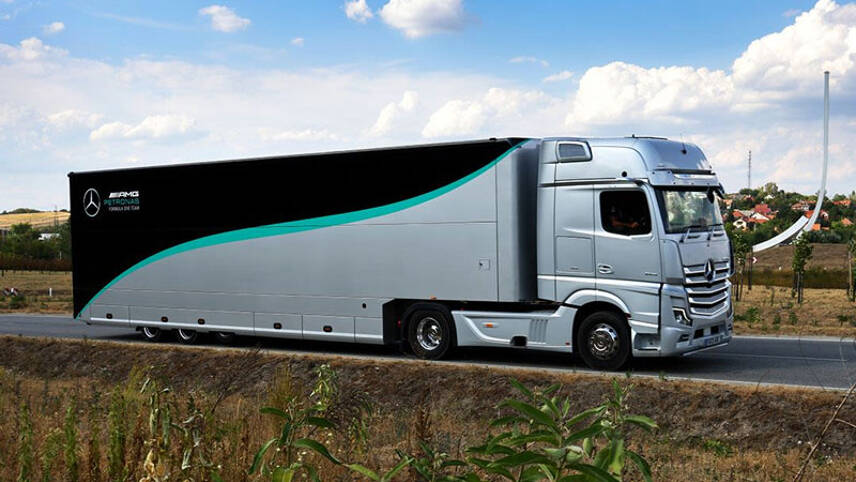Register for free and continue reading
Join our growing army of changemakers and get unlimited access to our premium content

Pictured: HGV fuelled by biofuel during this year's season in Europe. Image: Mercedes-AMG Petronas
The team, whose current drivers are Lewis Hamilton and George Russell, posted the news in its new sustainability report late last week. The report comes around three months before the end of the current F1 season.
A key focus of the report, alongside waste management and diversity and inclusion, is accelerating the team’s emissions reduction programme.
F1 itself, which is aiming for net-zero this decade, has stated that only 1% of a season’s overall emissions come from the racing cars. Instead, the majority is attributable to fan travel and to transporting teams, cars and equipment across the world.
The Mercedes-AMG Petronas F1 team has, therefore, piloted new ways of cutting emissions from transport. The new sustainability report reveals a 21% reduction in air travel emissions, resulting from increased efficiency and investment into alternative fuels (SAF).
Elsewhere, the report reveals that trials of biofuel within road freight reduced emissions from journeys across Europe by 88%. The team had been hoping for a minimum reduction in emissions of 60% by switching diesel for alternative drop-in fuels in heavy goods vehicles (HGVs) serving the last three European races of the season.
The report additionally notes a 13% reduction in gas use and only a 1% increase in total energy consumption, despite rapid expansion in terms of site space and employee headcount.
Emissions pathway
The team has not revealed its absolute emissions footprint as it has only just completed independently verifying its emissions baseline for the first time; there is no previous data to compare the figures to.
Nonetheless, the privately held baseline figures cover all three scopes and, based on the findings, the team will be applying to the Science-Based Targets initiative (SBTi) before the end of the year. It will then have two years to have these targets verified in line with net-zero by 2050 and 1.5C in the nearer term.
Through the SBTi’s net-zero standards, organisations are required to deliver a 90% reduction in absolute emissions across all scopes by 2050 at the latest.
The team believes it can be one of the first sports organisations to receive verification through this standard. It is aiming to eliminate Scope 1 (direct) and Scope 2 (power-related) emissions by 2030, relying on offsetting and removals for no more than 25%. It will develop full Scope 3 plans in the coming months.
“Performance at any cost, without thought of the wider repercussions, is no longer acceptable in today’s world – but being sustainable doesn’t have to mean compromise,” said team principal and chief executive Toto Wolff.
“Delivering sustainable high performance has become a guiding principle in the way we operate. Over the last year, we have grown our sustainability activities to get a better understanding of our impact on the planet and our role within society, and to further explore ways in which we can improve. Hitting the brakes isn’t an option.”
The Mercedes-AMG Petronas F1 team has notably promoted a new head of sustainability, Alice Ashpitel, earlier this year. She joined the team in 2022 having previously worked in sustainability in consultancy and construction.


Please login or Register to leave a comment.